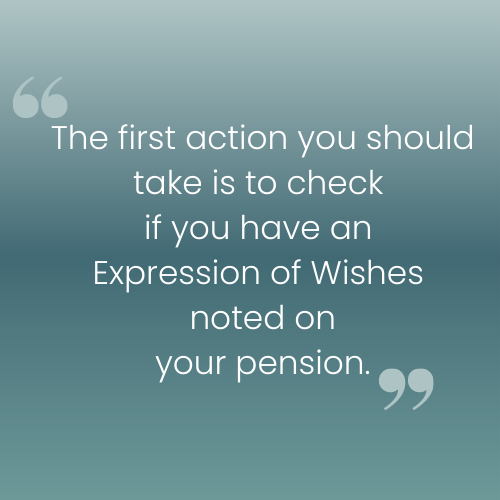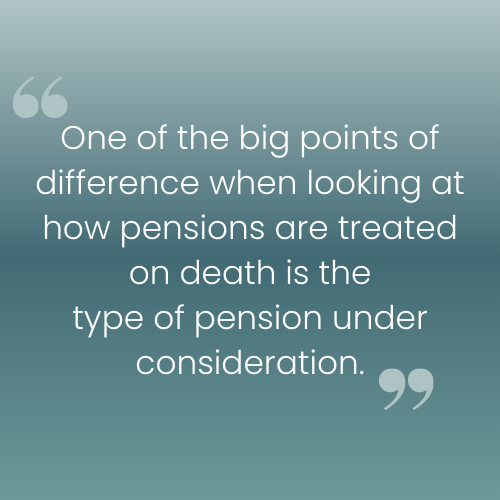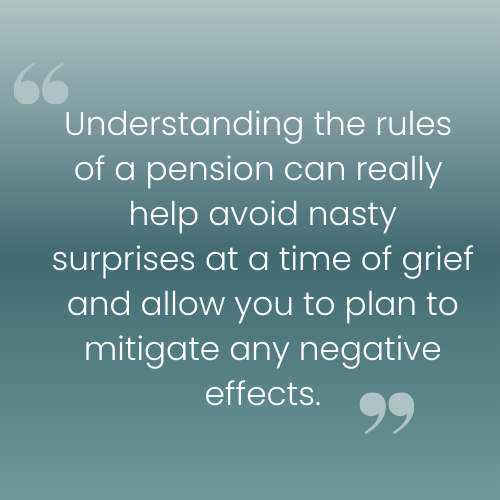A question you often ask when we talk about your estate
When we visit our clients to talk about Wills, we always talk a little about their estate and what is in it. Many of them ask “What happens to my pension when I die?” You may think there is a simple answer to this common question. The reality can be surprisingly complicated, so we asked our partners TP Financial Solutions, Heysham, to tell us more in a guest blog.
Who gets my pension?
Whether you think it obvious that it would go to your current spouse, be split equally between your children, go to your ‘next of kin’, or be dealt with in your Will – without specific and recorded expression of your wishes, the destination of your hard-earned money could be directed at the discretion of pension trustees.
Furthermore, there are different rules depending on the age at which you die, the type of pension you hold, whether it is in payment or not and even if you’re married or not at the time of your death.
So how to decipher the myriad options to make sure your pension benefits go where you want them to?
What do I need to do first?

The first action you should take is to check if you have an Expression of Wishes noted on your pension. You should be able to request a pro forma for this for all types of pensions and note your preferred beneficiary/beneficiaries. The execution of these wishes is still at the discretion of the trustees but without this being challenged, there is little chance of them disregarding it. It should cost you nothing to register this with the pension company and it’s best to keep a copy of this with your will or share your wishes with your beneficiaries so that they know what to expect. You may even be able to complete this online if you have a log in to your pension.
Expressions of Wishes are frequently made when pensions start and never revisited, often meaning ex-spouses are listed as nominated beneficiaries which I’m sure would not be an ideal conversation to be had after your death. This should be simple, quick and free to rectify so there’s no excuse to delay!
Not all pensions are the same!

One of the big points of difference when looking at how pensions are treated on death is the type of pension under consideration. In the next couple of paragraphs, we’ll consider the situation if you die before you access your pensions. Defined Benefit or Final Salary schemes tend to have more limited options and the rules can be archaic, for example, with lesser or no automatic rights for unmarried couples or same sex couples, even though you may have been together throughout your adult life. These rules need to change and be updated but for the time being, you could find that your life partner would be entitled to very little or nothing from this type of pension if you are not married at the time of your death. Understanding the rules of a pension can really help avoid nasty surprises at a time of grief and allow you to plan to mitigate any negative effects.
The other main types of pensions can be lumped together under the heading of ‘Defined Contribution’. This category includes all sorts of pensions, for example, Stakeholders, many employer sponsored schemes, SIPPs, SSASs and private pensions. Again, the individual rules of the pension will govern what happens when you die. If the rules on the plan state ‘return of fund’, the pension would pay out into your estate on death, whether your beneficiaries want it to or not. So if this was at a time of bad market conditions, the pension could be closed at a disadvantageous time. More modern style pensions would remain in place on death, with your beneficiaries being able to access the pension as and when suits them. This also keeps the benefits within the pension which can be beneficial for inheritance tax purposes. Again, it is easy to check the current rules on your pension and to make adjustments to suit your planning.
Your plans, actions and age all have an impact …

There is also a big difference in the destination of pension death benefits depending on whether the pension is in payment or not. For a defined benefit scheme in payment, many will offer a spouse’s pension of, for example, 50%, on the death of the policy holder. The term ‘spouse’ is automatically applied to married couples, but the same pitfall as explained above can happen for unmarried couples whereby, it is at the discretion of the trustees to pay out to you. The other point to consider here is if 50% of the income is sufficient to support your widowed spouse and if not, is there anything you can do about that now?
If you have an annuity (pension income) in payment, what happens to the income when you die depends on the choices you made when you set this up. You generally have options to provide some spouse’s pension in exchange for accepting a lower level of income for yourself. Usually, you can’t change annuities once they are in payment so taking advice and making sure the set up is right at the start is crucial.
Finally, if you are accessing your pension ‘flexibly’ by drawing down what you need and leaving the rest invested, the full amount of the remaining ‘pot’ is available for your beneficiaries to access. This would not automatically have to close and land into your estate, meaning your beneficiaries have control over how and when the pot is accessed. If you die prior to age 75, your beneficiary could access the pension free of tax and can draw lump sums, income, or a combination of the 2. If you die after age 75, your beneficiaries will pay tax at their marginal rate for any withdrawals.
Take advice!
Hopefully this helps answer the regular question of “What happens to your pension when I die?”. Each pension is different and making sure you know the facts can put you and your loved ones in the best possible position. This can be a complex are to wade through and speaking to your pension provider can be a good starting point to get more information. Following that, speaking to an adviser about the best option for you and your family can put your mind at ease.
For further information or for a friendly chat about pensions, contact TP Financial Solutions on 01524 920015
You can request more information about making your Wills here, or contact us on 01524 571032


